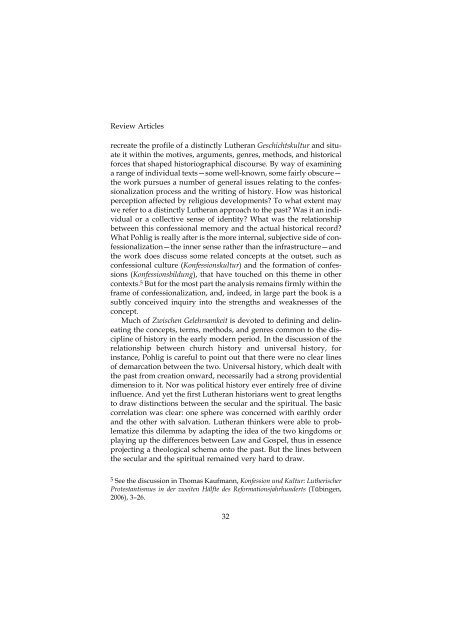Download - German Historical Institute London
Download - German Historical Institute London
Download - German Historical Institute London
Create successful ePaper yourself
Turn your PDF publications into a flip-book with our unique Google optimized e-Paper software.
Review Articles<br />
recreate the profile of a distinctly Lutheran Geschichtskultur and situate<br />
it within the motives, arguments, genres, methods, and historical<br />
forces that shaped historiographical discourse. By way of examining<br />
a range of individual texts—some well-known, some fairly obscure—<br />
the work pursues a number of general issues relating to the confessionalization<br />
process and the writing of history. How was historical<br />
perception affected by religious developments? To what extent may<br />
we refer to a distinctly Lutheran approach to the past? Was it an individual<br />
or a collective sense of identity? What was the relationship<br />
between this confessional memory and the actual historical record?<br />
What Pohlig is really after is the more internal, subjective side of confessionalization—the<br />
inner sense rather than the infrastructure—and<br />
the work does discuss some related concepts at the outset, such as<br />
confessional culture (Konfessionskultur) and the formation of confessions<br />
(Konfessionsbildung), that have touched on this theme in other<br />
contexts. 5 But for the most part the analysis remains firmly within the<br />
frame of confessionalization, and, indeed, in large part the book is a<br />
subtly conceived inquiry into the strengths and weaknesses of the<br />
concept.<br />
Much of Zwischen Gelehrsamkeit is devoted to defining and delineating<br />
the concepts, terms, methods, and genres common to the discipline<br />
of history in the early modern period. In the discussion of the<br />
relationship between church history and universal history, for<br />
instance, Pohlig is careful to point out that there were no clear lines<br />
of demarcation between the two. Universal history, which dealt with<br />
the past from creation onward, necessarily had a strong providential<br />
dimension to it. Nor was political history ever entirely free of divine<br />
influence. And yet the first Lutheran historians went to great lengths<br />
to draw distinctions between the secular and the spiritual. The basic<br />
correlation was clear: one sphere was concerned with earthly order<br />
and the other with salvation. Lutheran thinkers were able to problematize<br />
this dilemma by adapting the idea of the two kingdoms or<br />
playing up the differences between Law and Gospel, thus in essence<br />
projecting a theological schema onto the past. But the lines between<br />
the secular and the spiritual remained very hard to draw.<br />
5 See the discussion in Thomas Kaufmann, Konfession und Kultur: Lutherischer<br />
Protestantismus in der zweiten Hälfte des Reformationsjahrhunderts (Tübingen,<br />
2006), 3–26.<br />
32













